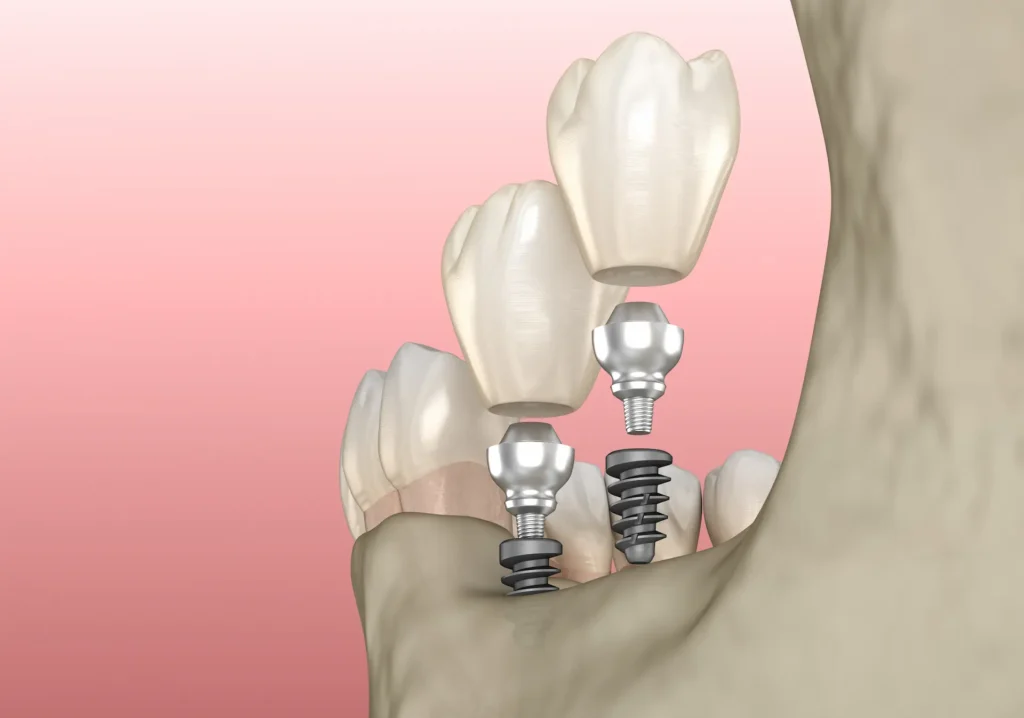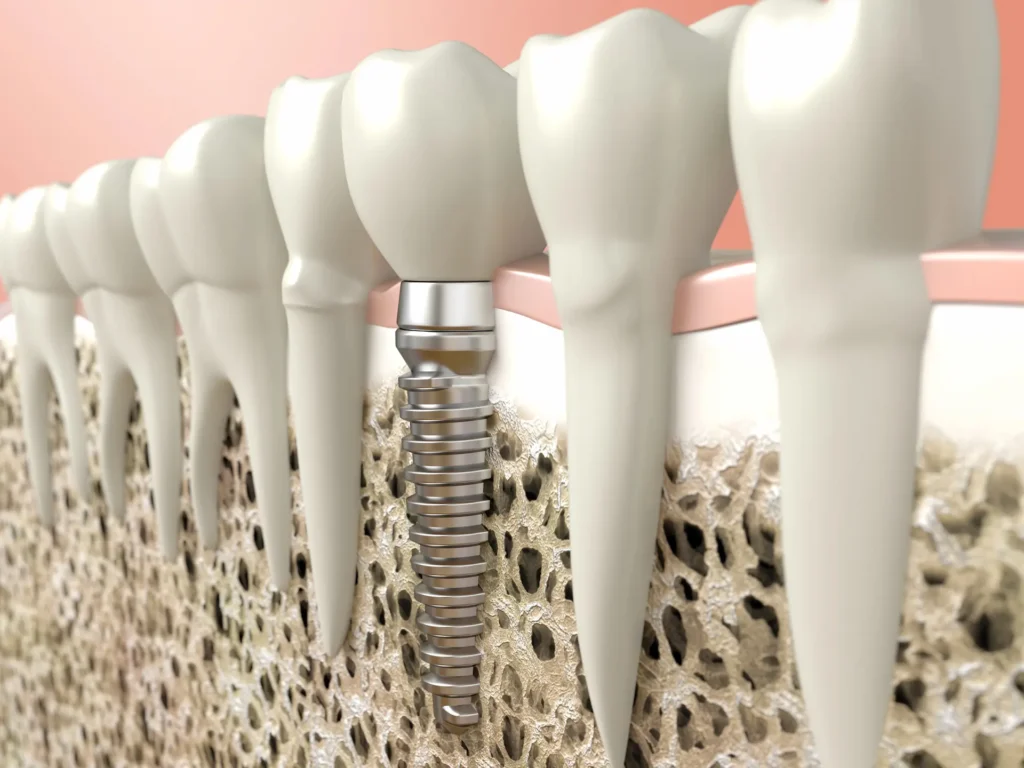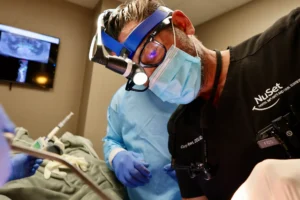Dental implants have revolutionized restorative dentistry, offering a durable solution for missing teeth. With advancements in dental technology, patients face a crucial decision: choosing between mini dental implants and traditional dental implants. This choice can significantly impact the effectiveness, comfort, and overall satisfaction with the dental restoration process.
This article compares mini dental implants vs. traditional dental implants, providing clear insights to help patients make well-informed decisions about their dental health.
Comparing Mini-Dental Implants and Traditional Dental Implants
When considering dental implants, it’s essential to understand how mini-dental implants differ from their traditional counterparts. Each type has unique characteristics and suits different dental needs.
Below is a detailed comparison summarizing the key differences between mini and traditional dental implants in terms of size, procedure, cost, recovery time, and suitability to assist you in making an informed choice.
| Features | Mini implants | Traditional dental implants |
| Size | Smaller in diameter, usually less than 3 mm | Typically range from 3.5 mm to 6 mm in diameter |
| Procedure | Less invasive, often requires no surgery | Involves surgery and sometimes bone grafting |
| Cost | Generally more affordable | Can be more expensive due to materials and procedure |
| Recovery time | Shorter, with minimal discomfort | Longer, as it involves surgical intervention |
These distinctions play a vital role in determining which type of implant is appropriate for your specific dental situation. It’s not just about choosing one over the other; it’s about finding the right fit for your unique oral health needs.
What are Mini Dental Implants?
As the name suggests, mini dental implants are a type of dental implant that is smaller in size compared to traditional implants. Typically, their diameter is less than 3 mm. Made from materials similar to traditional implants, like titanium, mini implants act as a small but sturdy base for replacing missing teeth.
The primary use for mini dental implants is in situations where the jawbone may not have enough density to support a traditional implant or when the space for the implant is narrow.
Mini dental implants are especially useful in stabilizing lower dentures. This smaller size and less invasive installation process make them an increasingly popular choice for certain dental restoration scenarios.
Advantages of Mini Dental Implants
Mini dental implants have the following benefits:
- Installing mini implants is less invasive, often eliminating the need for surgery.
- Mini dental implant procedures are quicker and less daunting for patients.
- Due to the less invasive nature of the procedure, recovery time is typically shorter.
- Patients experience minimal discomfort with mini implants
- Mini implants can be more cost-effective than traditional implants.
- They are ideal for limited space
- In some cases, mini implants can be loaded immediately, meaning they can anchor dentures or bridges immediately.
In cases where bone density is an issue or where a less invasive and more cost-effective solution is preferred, mini dental implants may be the ideal choice. However, it’s important to consult a dental professional to determine whether they are the right option for your dental needs.

Disadvantages of Mini Dental Implants
While mini dental implants offer several benefits, especially for specific dental conditions, they also have certain limitations. Here are some of the key disadvantages associated with mini dental implants:
- Less durable than traditional implants, potentially requiring earlier replacement.
- Less suitable for supporting heavier loads like full arch replacements.
- Over time, they may contribute to bone loss in the jaw.
- It is not ideal for all dental scenarios, especially where higher strength is needed.
- It may not provide the same level of stability as traditional implants in certain cases.
What are Traditional Dental Implants?
Traditional dental implants are a widely used solution for replacing multiple missing teeth. The implant itself is typically made from titanium and designed to mimic the root of a tooth. These implants are usually about 3.5 mm to 6 mm in diameter, making them larger than mini dental implants.
The standard procedure for installing traditional dental implants involves surgery. This process may include drilling into the jawbone to place the implant, and sometimes, bone grafting is necessary if the patient’s jawbone isn’t dense enough to support the implant. Due to their robust structure and the surgical procedure involved, traditional implants are known for their durability and stability.
Traditional implants are particularly well-suited for patients with good bone quality who need to replace larger gaps or require a more permanent and sturdy solution. Their size and strength make them ideal for supporting individual crowns, larger bridges, and full dentures.
One of the significant considerations with traditional dental implants is the extended healing and recovery time. The surgical procedure can lead to a longer period of discomfort and a more prolonged recovery phase compared to mini implants. This longer recovery time is a trade-off for traditional implants’ increased stability and longevity.

Benefits of Traditional Dental Implants
- Traditional implants are built for longevity and can last many years with proper care.
- Ideal for supporting full arch replacements and heavier restorations.
- Helps maintain jawbone integrity and prevent bone loss.
- Suitable for a wide range of dental restoration needs.
- Provides a stable foundation for crowns, bridges, and dentures.
Cons of Traditional Dental Implants
- Requires surgery, which can be more complex and invasive.
- Extended healing period post-surgery.
- Generally more expensive due to the materials and surgical procedure.
- Requires good bone density; may need bone grafting.
- Not suitable for patients with certain health conditions or insufficient bone structure.
Factors to Consider When Choosing Between Mini and Traditional Dental Implants
Deciding between mini and traditional dental implants requires careful consideration of several factors. These factors will help you determine the most suitable implant type for your dental health and lifestyle. Here are some crucial aspects to think about:
- Bone Density: Traditional implants need a good amount of healthy bone for support. If your jawbone isn’t dense enough, mini implants might be a better choice.
- Overall Health: Your general health, including conditions like diabetes or osteoporosis, can affect the success of implant surgery. Some health conditions favor one type of implant over the other.
- Budget: Mini implants are generally more affordable than traditional implants. Consider your budget when making a decision.
- Treatment Goals: Think about what you want to achieve with your implants. If you’re looking for a solution for smaller gaps or to stabilize dentures, mini implants could be ideal. For larger gaps or a permanent, robust solution, traditional implants might be the way to go.
- Recovery Time: If you prefer a shorter recovery period, mini implants offer a less invasive procedure with faster healing. While more invasive, traditional implants provide a more durable and long-term solution.
- Dental Situation: The complexity and specifics of your dental situation, such as the number of teeth to replace and the location in the mouth, play a significant role in determining the appropriate type of implant.
Discussing these factors with a dental professional who can provide personalized advice based on your dental history, current oral health, and specific needs is essential. A professional consultation is the best way to ensure you choose the implant type that aligns with your dental goals and overall health.
Let’s Help You Make the Best Decision For Your Dental Health
When it comes to restoring smiles and oral health, understanding the difference between mini dental implants and traditional dental implants is crucial.
Mini dental implants are a great choice for those seeking a less invasive, more affordable option, particularly in cases of lower bone density or smaller gaps. On the other hand, traditional dental implants are ideal for those who require a more durable and robust solution, especially for larger gaps or full arch restorations.
The importance of consulting with a qualified dentist cannot be overstated. A professional can assess your specific dental needs, considering factors like bone density, overall health, and budget, to determine the most suitable type of implant for you.
If you are considering dental implants, take the next step toward improving your oral health. Schedule a no-cost consultation with us at NuSet to discuss your options in detail.
Frequently Asked Questions
Are mini implants better than regular implants?
It depends on your specific dental needs. Mini implants are less invasive and more affordable, suitable for situations with lower bone density or smaller gaps. Regular or traditional implants can be more durable and better for larger gaps or full arch replacements.
What are the disadvantages of mini implants?
The main disadvantages of mini dental implants include
- Limited durability.
- Being less suitable for heavy loads.
- Potential for contributing to bone loss.
- Limited applicability in certain dental scenarios.
- Less stability compared to traditional implants.
How long will mini implants last?
The lifespan of mini implants can vary, but they may require replacement sooner than traditional implants. Their longevity depends on factors like oral hygiene, overall health, and the load they bear.
What is the success rate of mini dental implants?
The success rate of mini dental implants, according to a study in 2023, was 91.7% after 2 to 10 years. Still, it can vary based on the patient’s oral health condition, the dentist’s expertise, and how well the aftercare instructions are followed. It’s important to discuss success rates and expectations with your dentist.
Where can I get dental implants near me?
You can get dental implants at any of the NuSet Dental Implants clinics located near you. NuSet is known for our specialized services in dental implants. This will allow you to access professional dental implant services conveniently close to your area.
Our clinic locations:
- NuSet Dental Implants and Oral Surgery of St Louis
- 2821 North Ballas Road #225 St Louis, MO 63131 (Inside Town and Medical Building)
- Get driving directions
- NuSet Dental Implants and Oral Surgery of Scottsdale
- 8800 E. Raintree Dr Suite 170 Scottsdale, AZ 85260
- Get driving directions





